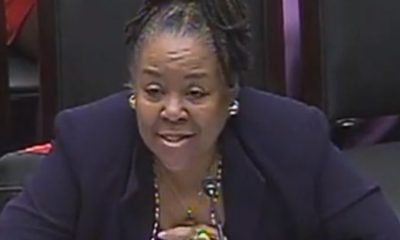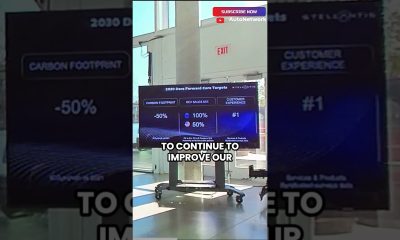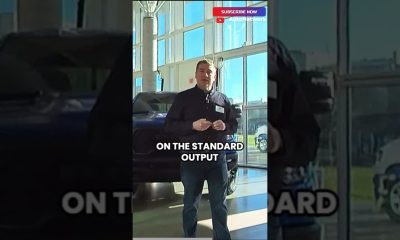Bay Area
Jehovah’s Witnesses Returning to In-Person Meetings
The move back to in-person meetings coincided with two global events being held in all 120,000 congregations of Jehovah’s Witnesses. The first was a special lecture scheduled in most congregations for April 10, 2022, entitled “Where Can You Find Real Hope?” Additionally, the annual commemoration of the death of Jesus Christ was held on April 15, 2022, the very day he sacrificed his life 1,989 years ago. Both of these gatherings were held in person at local Kingdom Halls with live speakers. No collections are ever taken.

After Two Years Virtual, Congregations Are Meeting Together Again
All congregations of Jehovah’s Witnesses worldwide were encouraged to resume in-person meetings last month.
The announcement to return to the Kingdom Hall was a pleasant and long-awaited surprise. “My initial thought was excitement,” said Andrena Morris, an Oakland resident who has been attending meetings for over 40 years. She treasures the love and unity felt when connecting with fellow congregants in person. Being at the meetings is vital for her. “It’s like a spiritual lifeline,” Morris said.
For most of the last two years, buildings for worship have remained closed globally due to the risks associated with meeting in person. Jehovah’s Witnesses in the U.S. also suspended their public ministry on March 20, 2020. Since that time, they have carried on their ministry through letters and phone calls while holding twice-weekly meetings in a virtual format. Average attendance at these meetings exceeded 1.5 million each week in the U.S., even though there are fewer than 1.3 million Jehovah’s Witnesses in some 13,000 congregations.
“There is a collective shout of joy among Jehovah’s Witnesses around the world right now,” said Robert Hendriks, U.S. spokesman for Jehovah’s Witnesses. “While we have prospered in many ways as individuals and congregations using technology to bring us together, nothing can adequately replace being together in person. We have longed for this moment for the better part of two years.”
The move back to in-person meetings coincided with two global events being held in all 120,000 congregations of Jehovah’s Witnesses. The first was a special lecture scheduled in most congregations for April 10, 2022, entitled “Where Can You Find Real Hope?” Additionally, the annual commemoration of the death of Jesus Christ was held on April 15, 2022, the very day he sacrificed his life 1,989 years ago. Both of these gatherings were held in person at local Kingdom Halls with live speakers. No collections are ever taken.
“The timing of resuming in-person meetings could not be better,” said Hendriks. “Bringing everyone back together for these special events will have a powerful effect on the worldwide congregation.”
Guidelines for holding “hybrid” meetings have been sent to all congregations in the United States. Over the past six months, many Kingdom Halls have been equipped with the required technology to hold a productive meeting that allows for in-person and remote attendees, all of whom can participate in the discussions.
A pilot program was held in October and November 2021 in countries around the world to assess how this could be done most effectively. The lessons learned in these pilot meetings have helped form the plan for moving forward with reopening all Kingdom Halls, where the law permits.
“It has been heartwarming to see the peace and unity among Jehovah’s Witnesses during this very divisive time,” said Hendriks. “We know resuming in-person meetings will bring us even closer together. We’re anxious to see one another again.”
Anticipating seeing her spiritual family in person, Morris became emotional. “The biggest thing I remember as we headed to the Kingdom Hall was seeing the parking lot full of cars,” said Morris. “I could just feel my heart stir.”
As of now, Jehovah’s Witnesses have no plans to resume their public ministry, though their “alternative” ministry continues. In fact, since the start of the pandemic through November 2021 in the U.S. alone, Jehovah’s Witnesses spent more than 400 million hours in virtual Bible studies, writing letters of comfort to their neighbors and making phone calls.
They have released 77 new language translations of the Bible and held two global virtual conventions in more than 500 languages.
“No time was wasted in the past two years,” said Hendriks. “Our congregants have been busy and productive helping each other and their neighbors through this most challenging time. That’s what love and unity are all about.”
For more information on Jehovah’s Witnesses go to jw.org.
Activism
Oakland Post: Week of April 24 – 30, 2024
The printed Weekly Edition of the Oakland Post: Week of April 24 – 30, 2024

To enlarge your view of this issue, use the slider, magnifying glass icon or full page icon in the lower right corner of the browser window. ![]()
Alameda County
DA Pamela Price Stands by Mom Who Lost Son to Gun Violence in Oakland
Last week, The Post published a photo showing Alameda County District Attorney Pamela Price with Carol Jones, whose son, Patrick DeMarco Scott, was gunned down by an unknown assailant in 2018.

Publisher’s note: Last week, The Post published a photo showing Alameda County District Attorney Pamela Price with Carol Jones, whose son, Patrick DeMarco Scott, was gunned down by an unknown assailant in 2018. The photo was too small for readers to see where the women were and what they were doing. Here we show Price and Jones as they complete a walk in memory of Scott. For more information and to contribute, please contact Carol Jones at 510-978-5517 at morefoundation.help@gmail.com. Courtesy photo.
Bay Area
State Controller Malia Cohen Keynote Speaker at S.F. Wealth Conference
California State Controller Malia Cohen delivered the keynote speech to over 50 business women at the Black Wealth Brunch held on March 28 at the War Memorial and Performing Arts Center at 301 Van Ness Ave. in San Francisco. The Enterprising Women Networking SF Chapter of the American Business Women’s Association (ABWA) hosted the Green Room event to launch its platform designed to close the racial wealth gap in Black and Brown communities.

By Carla Thomas
California State Controller Malia Cohen delivered the keynote speech to over 50 business women at the Black Wealth Brunch held on March 28 at the War Memorial and Performing Arts Center at 301 Van Ness Ave. in San Francisco.
The Enterprising Women Networking SF Chapter of the American Business Women’s Association (ABWA) hosted the Green Room event to launch its platform designed to close the racial wealth gap in Black and Brown communities.
“Our goal is to educate Black and Brown families in the masses about financial wellness, wealth building, and how to protect and preserve wealth,” said ABWA San Francisco Chapter President LaRonda Smith.
ABWA’s mission is to bring together businesswomen of diverse occupations and provide opportunities for them to help themselves and others grow personally and professionally through leadership, education, networking support, and national recognition.
“This day is about recognizing influential women, hearing from an accomplished woman as our keynote speaker and allowing women to come together as powerful people,” said ABWA SF Chapter Vice President Velma Landers.
More than 60 attendees dined on the culinary delights of Chef Sharon Lee of The Spot catering, which included a full soul food brunch of skewered shrimp, chicken, blackened salmon, and mac and cheese.
Cohen discussed the many economic disparities women and people of color face. From pay equity to financial literacy, Cohen shared not only statistics, but was excited about a new solution in motion which entailed partnering with Californians for Financial Education.
“I want everyone to reach their full potential,” she said. “Just a few weeks ago in Sacramento, I partnered with an organization, Californians for Financial Education.
“We gathered 990 signatures and submitted it to the [California] Secretary of State to get an initiative on the ballot that guarantees personal finance courses for every public school kid in the state of California.
“Every California student deserves an equal opportunity to learn about filing taxes, interest rates, budgets, and understanding the impact of credit scores. The way we begin to do that is to teach it,” Cohen said.
By equipping students with information, Cohen hopes to close the financial wealth gap, and give everyone an opportunity to reach their full financial potential. “They have to first be equipped with the information and education is the key. Then all we need are opportunities to step into spaces and places of power.”
Cohen went on to share that in her own upbringing, she was not guided on financial principles that could jump start her finances. “Communities of color don’t have the same information and I don’t know about you, but I did not grow up listening to my parents discussing their assets, their investments, and diversifying their portfolio. This is the kind of nomenclature and language we are trying to introduce to our future generations so we can pivot from a life of poverty so we can pivot away and never return to poverty.”
Cohen urged audience members to pass the initiative on the November 2024 ballot.
“When we come together as women, uplift women, and support women, we all win. By networking and learning together, we can continue to build generational wealth,” said Landers. “Passing a powerful initiative will ensure the next generation of California students will be empowered to make more informed financial decisions, decisions that will last them a lifetime.”
-

 Activism4 weeks ago
Activism4 weeks agoOakland Post: Week of March 27 – April 2, 2024
-

 #NNPA BlackPress4 weeks ago
#NNPA BlackPress4 weeks agoCOMMENTARY: D.C. Crime Bill Fails to Address Root Causes of Violence and Incarceration
-

 #NNPA BlackPress4 weeks ago
#NNPA BlackPress4 weeks agoMayor, City Council President React to May 31 Closing of Birmingham-Southern College
-

 #NNPA BlackPress4 weeks ago
#NNPA BlackPress4 weeks agoBeloved Actor and Activist Louis Cameron Gossett Jr. Dies at 87
-

 Community1 week ago
Community1 week agoFinancial Assistance Bill for Descendants of Enslaved Persons to Help Them Purchase, Own, or Maintain a Home
-

 Activism3 weeks ago
Activism3 weeks agoOakland Post: Week of April 3 – 6, 2024
-

 Business1 week ago
Business1 week agoV.P. Kamala Harris: Americans With Criminal Records Will Soon Be Eligible for SBA Loans
-

 Activism2 weeks ago
Activism2 weeks agoOakland Post: Week of April 10 – 16, 2024




















































